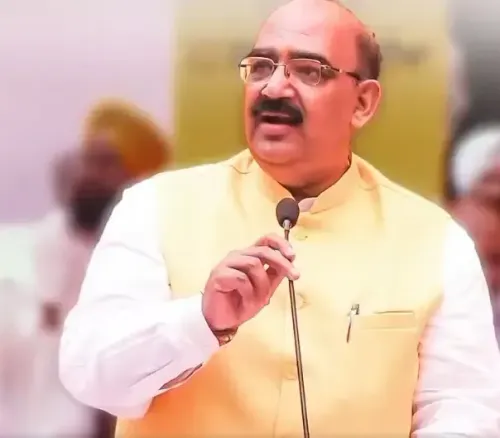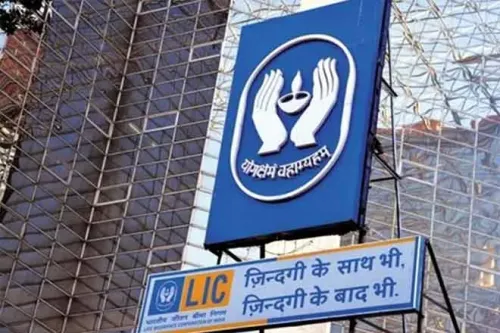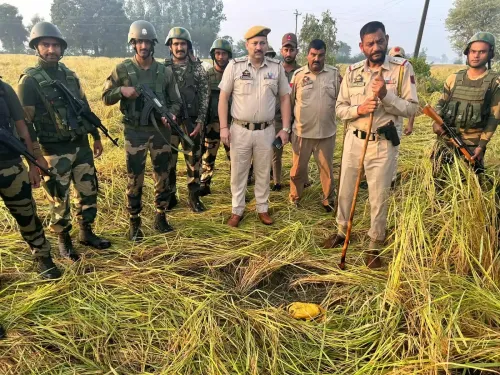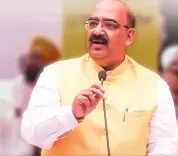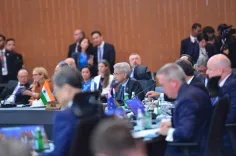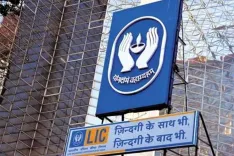Understanding the Waqf (Amendment) Bill, 2024

Synopsis
Key Takeaways
- Introduction of technology for better Waqf management.
- Strengthened representation in Waqf Boards.
- Clear provisions for government property classification.
- Enhanced accountability and transparency in Waqf affairs.
- Addressing issues of property disputes and mismanagement.
New Delhi, April 1 (NationPress) The Union government declared on Tuesday that the Waqf (Amendment) Bill will be presented in the Lok Sabha on April 2, right after the Question Hour, followed by an extensive discussion lasting up to eight hours. IANS provides a detailed history and facts regarding the Bill and the surrounding controversy.
On August 8, 2024, two bills were introduced in the Lok Sabha: the Waqf (Amendment) Bill, 2024, and the Mussalman Wakf (Repeal) Bill, 2024. Their purpose is to enhance the operational efficiency of the Waqf Board and ensure effective management of Waqf properties.
The Waqf (Amendment) Bill, 2024 aims to modify the Waqf Act of 1995 to address existing challenges in managing and regulating Waqf properties. The Amendment Bill seeks to enhance the administration and management of Waqf properties throughout India.
This Bill strives to tackle the limitations of the prior act and enhance the efficiency of Waqf boards by introducing reforms such as renaming the Act; updating Waqf definitions; streamlining the registration process; and leveraging technology for managing Waqf records.
The FAQs below explain the Waqf Amendment 2024 Bill.
What are the administrative bodies responsible for Waqf management in India, and what roles do they fulfill?
The management of Waqf properties across India is currently governed by the Waqf Act of 1995, which is regulated by the Central Government. The primary administrative entities involved in Waqf management comprise:
The Waqf Act of 1995, enforced by the Central Government, oversees Waqf properties. The main administrative bodies include: Central Waqf Council (CWC) – Advises the government and State Waqf Boards on policy matters but does not directly manage Waqf properties; State Waqf Boards (SWBs) – Responsible for managing and safeguarding Waqf properties within each state; and Waqf Tribunals – Exclusive judicial bodies that address disputes concerning Waqf properties.
This system guarantees improved management and expedited resolution of issues. Over the years, legal modifications have rendered Waqf administration more transparent, effective, and accountable.
What issues are associated with the Waqf Board?
Irrevocability of Waqf Properties: The principle of 'once a Waqf, always a Waqf' has led to disputes, including claims over islands in Bet Dwarka, which courts find perplexing.
Legal Disputes & Poor Management: The Waqf Act of 1995 and its 2013 amendment have proven ineffective. Issues include illegal occupation of Waqf land; mismanagement and ownership disputes; delays in property registrations and surveys; and numerous litigation cases and complaints to the Ministry.
No Judicial Oversight: Decisions made by Waqf Tribunals are not subject to challenge in higher courts, which decreases transparency and accountability in Waqf management.
Incomplete Surveys of Waqf Properties: The performance of the Survey Commissioner has been subpar, leading to delays; in states like Gujarat and Uttarakhand, surveys have yet to commence; in Uttar Pradesh, a survey ordered in 2014 remains pending; lack of expertise and poor coordination with the Revenue Department have hampered the registration process.
Misuse of Waqf Laws: Some State Waqf Boards have abused their powers, resulting in community tensions; Section 40 of the Waqf Act has been widely misused to classify private properties as Waqf properties, resulting in legal disputes and unrest; information from 30 States/UTs indicates that only 8 States reported that 515 properties were declared as Waqf under Section 40.
Constitutional Validity of the Waqf Act: The Waqf Act applies solely to one religion, while no similar legislation exists for others; a PIL (Public Interest Litigation) has been filed in the Delhi High Court questioning the constitutionality of the Waqf Act. The Delhi High Court has requested a response from the Central Government regarding this matter.
What steps and consultations were taken by the Ministry before introducing the bill?
The Ministry of Minority Affairs consulted multiple stakeholders, including reports from the Sachar Committee, concerns raised by public representatives, media, and the general public regarding mismanagement, misuse of Waqf Act powers, and the underutilization of Waqf properties. The Ministry also engaged with State Waqf Boards.
The Ministry began reviewing the provisions of the Waqf Act of 1995 and held consultations with stakeholders. Two meetings were conducted—one in Lucknow on July 24, 2023, and another in New Delhi on July 20, 2023—where many issues were discussed in detail. A consensus emerged to amend the Act suitably to resolve the problems faced by the affected stakeholders.
Expanding the Base of CWC (Central Waqf Council) and SWB (State Waqf Board) Composition:
Roles and responsibilities of Mutawallis; restructuring of tribunals; enhancing the registration process; declaration of titles; surveying Waqf properties; mutation of Waqf properties; filing accounts by Mutawallis; reforms in annual reporting; reviewing provisions related to evacuee properties/limitation act; and scientifically managing Waqf properties.
Additionally, the Ministry analyzed international practices in Waqf management from countries such as Saudi Arabia, Egypt, Kuwait, Oman, Pakistan, Bangladesh, and Turkey, discovering that Waqf properties are typically regulated by government-established laws and institutions.
What was the process for introducing the Waqf Amendment Bill 2024?
The Waqf Amendment Bill 2024 was introduced with the primary goal of addressing deficiencies in the management and governance of Waqf properties on August 8, 2024. On August 9, 2024, both Houses of Parliament referred the Bill to a Joint Committee composed of 21 Lok Sabha and 10 Rajya Sabha members for examination and reporting. Acknowledging the Bill's significance and its broad implications, the Committee opted to solicit public opinion and expert stakeholder input on the provisions of the Bill. The Joint Parliamentary Committee conducted thirty-six sittings, during which they gathered opinions and suggestions from various ministries and departments, including: Ministries of Minority Affairs, Law and Justice, Railways (Railway Board), Housing and Urban Affairs, Road Transport and Highways, Culture (Archaeological Survey of India), State Governments, State Waqf Boards, and experts/stakeholders.
The first sitting occurred on August 22, 2024, and key organizations/stakeholders consulted during these sessions included: All India Sunni Jamiyatul Ulama, Mumbai; Indian Muslims of Civil Rights (IMCR), New Delhi; Muttaheda Majlis-e-Ulema, J&K (Mirwaiz Umar Farooq); Zakat Foundation of India; Anjuman E Shiteali Dawoodi Bohra Community; Chanakya National Law University, Patna; All India Pasmanda Muslim Mahaaz, Delhi; All India Muslim Personal Law Board (AIMPLB), Delhi; All India Sufi Sajjadanashin Council (AISSC), Ajmer; Muslim Rashtriya Manch, Delhi; Muslim Women Intellectual Group - Dr. Shalini Ali, National Convener; Jamiat Ulama-i-Hind, Delhi; Shia Muslim Dharamguru and Intellectual Group; and Darul Uloom Deoband.
The following outlines the primary differences between the Waqf Act of 1995 and the Waqf (Amendment) Bill 2024.
Name of the Act:
The Waqf Act of 1995 is the original legislation governing Waqf properties in India.
The Waqf (Amendment) Bill, 2024 renames the act to "Unified Waqf Management, Empowerment, Efficiency, and Development Act, 1995," reflecting a broader focus on management and governance.
Formation of Waqf:
Under the Waqf Act of 1995, Waqf properties can be established through a declaration by the donor or through an act of endowment.
The Waqf (Amendment) Bill, 2024 stipulates that properties can only be declared as Waqf by a practicing Muslim who has been such for at least five years. It also ensures that women's inheritance rights are respected before any dedication to Waqf.
Government Property as Waqf:
The Waqf Act of 1995 lacks specific provisions regarding government property being designated as Waqf.
The Waqf (Amendment) Bill, 2024 introduces a provision that government properties identified as Waqf will no longer be considered as Waqf, with disputes over such properties resolved by the Collector.
Survey and Registration of Waqf Properties:
The Waqf Act of 1995 mandates surveying Waqf properties, yet this has frequently been incomplete or delayed.
The Waqf (Amendment) Bill, 2024 emphasizes that surveys will be conducted by Collectors under state revenue laws, ensuring proper identification and registration of Waqf properties.
Composition of the Central Waqf Council:
The Waqf Act of 1995 requires the Central Waqf Council to comprise solely Muslims.
The Waqf (Amendment) Bill, 2024 modifies this composition by adding two non-Muslims and two Muslim women members to enhance representation and diversity.
Tribunal Composition:
Under the Waqf Act of 1995, Waqf Tribunals are led by a judge along with Muslim law experts.
The Waqf (Amendment) Bill, 2024 substitutes Muslim law experts with a District Court judge and a joint secretary from the Ministry of Minority Affairs, creating a more legally structured tribunal.
Appeal on Tribunal Orders:
The Waqf Act of 1995 does not facilitate easy appeal from Waqf Tribunal decisions.
The Waqf (Amendment) Bill, 2024 allows appeals to the High Court within 90 days of the Tribunal’s judgment, enabling further judicial scrutiny.
Powers of the Central Government:
The Waqf Act of 1995 grants the Central government authority to issue directives to State Waqf Boards but does not explicitly define the power to formulate detailed regulations.
The Waqf (Amendment) Bill, 2024 provides the Central Government with explicit powers to establish rules regarding Waqf registration, auditing, and property management, ensuring enhanced central oversight.
Misuse of Waqf Laws:
Under the Waqf Act of 1995, there were provisions, particularly under Section 40, that enabled Waqf Boards to declare private and even government properties as Waqf, resulting in widespread misuse and disputes.
The Waqf (Amendment) Bill, 2024 abolishes Section 40, ensuring that only properties genuinely dedicated to Waqf by Muslims are registered as such, thereby protecting non-Muslim properties from arbitrary declarations.
Essentially, the Waqf (Amendment) Bill, 2024 seeks to modernize and enhance the governance of Waqf properties by addressing the inefficiencies and legal loopholes within the Waqf Act of 1995, promoting increased transparency, accountability, and inclusivity in the management of Waqf assets.
The Committee received a total of 97,27,772 memoranda through both physical and digital channels.
To thoroughly analyze the Waqf Amendment Bill, 2024, the Committee conducted detailed study visits across numerous cities in India. These visits allowed members to engage with stakeholders, assess ground realities, and gather region-specific insights concerning Waqf property management.
The specifics of the study visits across 10 cities are as follows: September 26 – October 1, 2024: Mumbai, Ahmedabad, Hyderabad, Chennai, Bengaluru; November 9 – 11, 2024: Guwahati, Bhubaneshwar; January 18 – 21, 2025: Patna, Kolkata, Lucknow; the Committee consulted 25 State Waqf Boards (7 in Delhi, 18 during visits) to discuss administrative challenges and legal obstacles. Subsequently, the Joint Committee completed a clause-by-clause review of all Bill Clauses at their 37th sitting held on January 27, 2025. The amendments proposed by the Members were voted upon and approved by majority votes; the Adoption draft report was authorized for presentation by the Chairperson. The 38th sitting was held on January 29, 2025; the Joint Committee submitted its report to the Hon’ble Speaker of Lok Sabha on January 31, 2025, and presented it in both Houses of Parliament on February 13, 2025.
What are some key reforms of the Waqf Amendment Bill 2024?
The proposed amendments under this Bill, 2024 aim to revolutionize Waqf administration in India by ensuring enhanced governance, transparency, and accountability. It seeks to establish a streamlined, technology-driven, and legally robust framework for managing Waqf properties while promoting socio-economic development for the intended beneficiaries.
Unified Waqf Management: Key issues affecting Waqf properties include incomplete surveys; substantial backlogs of litigations in Tribunals and Waqf Boards; improper accounting, auditing, and monitoring of Mutawallis; and inadequate mutation of all Waqf properties.
Empowerment of Central Waqf Council & State Waqf Boards: Inclusion of diverse groups such as non-Muslims, other Muslim communities, and women in decision-making roles to enhance representation and efficiency.
Efficiency of State Waqf Boards: A digital portal and database will automate Waqf registration, surveying, mutation, audits, leasing, and litigation, ensuring a scientific, efficient, and transparent governance process.
Development of Auqaf: Portal-based lifecycle management will enhance administration; Section 65 requires Waqf Boards to submit reports on management and income improvements within six months, ensuring timely action; Section 32(4) allows Waqf Boards to transform Waqf lands into educational institutions, shopping centers, markets, or housing by taking over properties from Mutawallis when necessary.
What key reforms has the Joint Committee recommended?
The amendments to the Waqf Act of 1995, as recommended by the Joint Committee on Waqf Amendment Bill, 2024 (JCWAB), introduce progressive reforms, including:
Key Reforms in Waqf (Amendment) Bill 2024, separating Trusts from Waqf: Muslim-created trusts under any law will no longer be classified as Waqf, ensuring complete control over trusts.
Technology & Central Portal: A centralized portal will automate Waqf property management, including registration, audits, contributions, and litigation, ensuring efficiency and transparency. This also efficiently utilizes technology for the automation of Waqf management.
Eligibility for Waqf Dedication: Only practicing Muslims (for a minimum of five years) can dedicate their own property to Waqf, reinstating the pre-2013 provision.
Protection of ‘Waqf by User’ Properties: Already registered properties will remain Waqf unless disputed or identified as government land.
Women's Rights in Family Waqf: Women must receive their rightful inheritance prior to Waqf dedication, with special provisions for widows, divorced women, and orphans.
Transparent Waqf Management: Mutawallis are required to register property details on the central portal within six months to enhance accountability.
Government Land & Waqf Disputes: An officer above the rank of Collector will investigate government properties claimed as Waqf, preventing unwarranted claims.
Strengthening Waqf Tribunals: A structured selection process and fixed tenure ensure stability and efficiency in dispute resolution.
Non-Muslim Representation: Two non-Muslim members will be included in both Central and State Waqf Boards to ensure inclusivity.
Reduced Annual Contributions: Mandatory contributions from Waqf institutions to Waqf Boards are reduced from 7% to 5%, allowing for more funds to be directed towards charitable causes.
Application of the Limitation Act: The Limitation Act of 1963 will now apply to Waqf property claims, minimizing prolonged litigation.
Annual Audit Reforms: Waqf institutions generating over Rs 1 lakh annually must undergo audits by state government-appointed auditors.
Ending Arbitrary Property Claims: The Bill abolishes Section 40, preventing Waqf Boards from arbitrarily declaring properties as Waqf, thereby avoiding misuse such as designating entire villages as Waqf.
These instances highlighted the arbitrary and unregulated power exerted by Waqf Boards. To address this, Section 40 of the Waqf Act is being removed, ensuring fair and just administration of Waqf properties.
What are some instances of Non-Muslim properties declared as Waqf?
As of September 2024, data from 25 States/UTs Waqf Boards reveals that 5,973 government properties have been declared as Waqf. Some notable examples include:
According to the MoHUA (Ministry of Housing and Urban Affairs) in September 2024, 108 properties fall under the control of the Land and Development Office, 130 properties under the Delhi Development Authority, and 123 properties in the public domain were declared as Waqf properties, leading to litigation.
In Karnataka (1975 & 2020), 40 Waqf properties were notified, including farmlands, public spaces, government lands, graveyards, lakes, and temples.
The Punjab Waqf Board has claimed land belonging to the Education Department in Patiala.
Examples of other Non-Muslim properties declared as Waqf include:
Tamil Nadu: A farmer in Thiruchenthurai village was unable to sell his land due to the Waqf Board’s claim over the entire village, which hindered him from selling his land to repay a loan for his daughter's wedding.
Govindpur Village, Bihar: In August 2024, the Bihar Sunni Waqf Board’s claim over an entire village affected seven families, leading to a case in the Patna High Court, which is currently sub-judice.
Kerala: In September 2024, around 600 Christian families in Ernakulam district are contesting the Waqf Board’s claim over their ancestral land and have appealed to the Joint Parliamentary Committee.
Karnataka: In 2024, farmers protested after the Waqf Board designated 15,000 acres in Vijayapura as Waqf land. Disputes also arose in Ballari, Chitradurga, Yadgir, and Dharwad. The government, however, assured that no evictions would occur.
Uttar Pradesh: Allegations of corruption and mismanagement have been directed at the State Waqf Board.
How is the Waqf Amendment Bill 2024 expected to benefit the Poor?
The Waqf system plays a vital role in addressing religious, charitable, and social welfare needs, particularly for disadvantaged communities. However, its impact has often diminished due to mismanagement, encroachment, and lack of transparency. Key benefits of Waqf for the impoverished include:
Digitization for Transparency and Accountability: A centralized digital portal will facilitate tracking Waqf properties, ensuring better identification, oversight, and management.
Auditing and accounting measures will deter financial mismanagement and ensure funds are allocated solely for welfare purposes.
Increased Revenue for Welfare and Development: Preventing misuse and illegal occupation of Waqf lands will enhance revenue for Waqf Boards, enabling them to broaden welfare initiatives.
Funds will be directed toward healthcare, education, housing, and livelihood support, directly benefiting economically disadvantaged sections.
Regular audits and inspections will foster financial discipline and strengthen public trust in Waqf management.
How does the inclusion of non-Muslim members in the Waqf Board and Central Waqf Council contribute to Waqf management, and what is their role and influence in decision-making?
Non-Muslim Stakeholders: Donors, litigants, lessees, and tenants are integral to Waqf management, making their representation in Waqf Boards and the Central Waqf Council (CWC) essential for fairness.
Regulation of Secular Activities: Section 96 empowers the Central Government to manage governance, social, economic, and welfare aspects of Waqf institutions, reaffirmed by court rulings.
Oversight Role of Central Waqf Council: The CWC oversees State Waqf Boards, ensuring compliance without direct control over Waqf properties. This indicates that Waqf management transcends religious aspects to encompass economic and financial regulation.
Non-Muslim Representation: In State Waqf Boards: 2 out of 11 members (excluding ex-officio) can be non-Muslims; and in the Central Waqf Council: 2 out of 22 members (excluding ex-officio) can be non-Muslims.
While decisions are typically made by majority vote, non-Muslim members can contribute administrative and technical expertise, enhancing the efficiency and governance of Waqf institutions.

